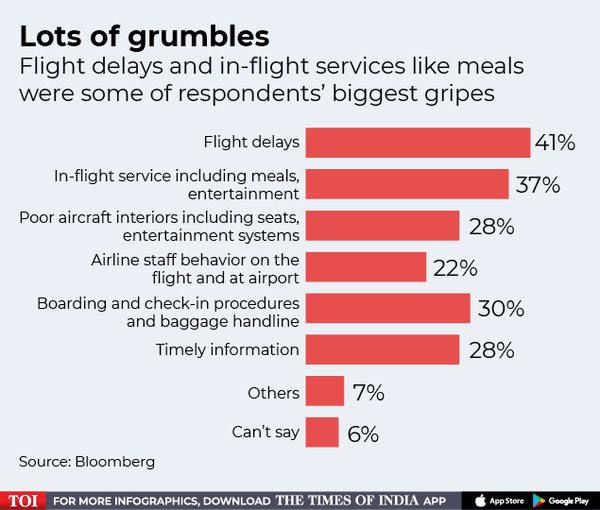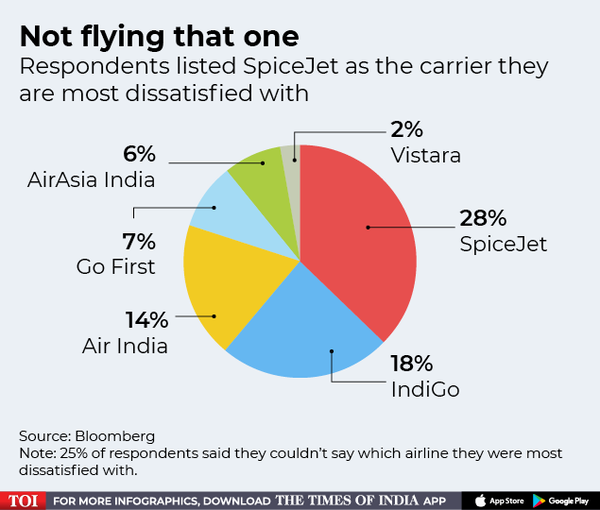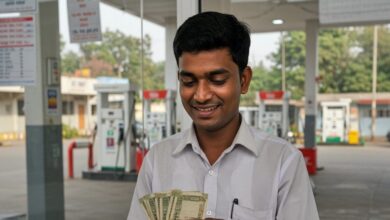Airline: Majority of Indian airline passengers unhappy at lousy service | India Business News

Some 79% of the 15,000 airline passengers surveyed by LocalCircles said they believe carriers in India are compromising on passenger comfort and cutting corners as a result of the pandemic, souring the reopening of what was prior to Covid the world’s fastest-growing aviation market.
Topping respondents’ list of airlines whose service was deemed most unsatisfactory was SpiceJet Ltd., followed by the country’s biggest airline with a 55% market share, IndiGo. Complaints across all airlines included flight delays, shoddy in-flight service, bad boarding procedures and tatty aircraft interiors.
SpiceJet said it is prioritizing automation, technology and sustainability to improve customers’ experience. IndiGo said it is also focusing on digitization to give customers a contactless travel experience, noting that using technology at check-in to boarding and beyond has helped it reduce wait times at airports.
The results come as Indian carriers find themselves on the receiving end of a degree of backlash from passengers. In one recent high-profile incident, IndiGo barred a disabled teenager from boarding a flight, saying the boy was causing a disturbance and could pose a safety threat.
The aviation regulator launched a preliminary inquiry into the matter that found IndiGo didn’t conform with rules and its staff inappropriately handled the passenger. The investigation is ongoing. IndiGo said in a statement at the time that it made the “best possible decision under difficult circumstances.”
Yesterday an @IndiGo6E staff at Ranchi Airport did this. Shame on you @IndiGo6E.@JM_Scindia @DGCAIndia @PMOIndia… https://t.co/WUslO0qJNO
— Abhinandan Mishra (@mishra_abhi) 1651997975000
Aditya Jha, a New Delhi-based writer who witnessed the incident firsthand, said IndiGo “singled out” the child and “robbed him of his basic human right to fly.” Passengers on the flight, some of whom were doctors, tried to convince IndiGo it was perfectly safe, to no avail.
“Airline service has definitely deteriorated since the pandemic,” Jha said in an interview with Bloomberg. “There’s no alternative to flying, but there’s definitely alternative airlines.”
In another video that recently went viral a woman is seen suffering a panic attack after Air India Ltd., now under the management of India’s largest conglomerate Tata Group, prevented her from boarding, saying she arrived after the gate shut.
While many airlines and airports around the world have been caught short by a quicker-than-expected rebound in travel as pandemic prevention rules are loosened and Covid testing falls away, Indian carriers — notorious for their cut throat fares — are particularly struggling.
The nation has a vast domestic market and lured by still-cheap tickets, customers have surged back to airports in their tens of millions, stretching an aviation workforce depleted and weakened by one of the world’s worst Covid outbreaks. At the same time, spiraling fuel expenses have burdened balance sheets just as airlines are trying to add capacity.

As demand rushes back, meeting passenger expectations in a world where people are being told to live with the virus has become harder. Some are finicky about sanitization standards or not eating onboard while others rail against wearing a mask all the time. Fatigued cabin crew can end up taking out their frustrations in a counterproductive way.
“Airlines don’t have a playbook for customer service because customer preferences have changed and they’re still clutching at straws trying to figure out what the customer wants,” said Ajay Awtaney, editor of aviation website LiveFromALounge.com.
Widespread staff shortages and disgruntled labor forces aren’t helping. IndiGo, which dipped back into the red in its latest quarter, laid off 10% of its staff in 2020 and asked all employees to take some leave without pay last year. SpiceJet deferred salaries and, when passenger traffic plunged to near zero during India’s second Covid wave, paid some employees based on their work hours.
While airlines are trying to recruit more crew, the reality is they won’t be able to do so at the pace demand is rebounding, Awtaney said. Experienced crew are meanwhile being poached by upstart carriers Akasa Air and Jet Airways India Ltd., and new hires need to go through a three to four month training process before they can board a plane, he said.
Indian airlines are also charging for more ancillaries at a time when they’re raising ticket prices to fight fuel costs. Cost-conscious fliers have to pay 200 rupees ($2.60) for a boarding pass at the airport if they haven’t done web check-in, for example. Civil aviation minister Jyotiraditya Scindia said he’ll examine the practice, introduced to reduce touchpoints as a result of Covid, after a SpiceJet passenger complained.

Passenger dissatisfaction can also be magnified in India, where no-frills carriers make up 85% of the market. While US and European legacy carriers — full-service airlines that have loyalty programs — can waive charges for top tier members, in India, loyal passengers can often still find themselves in a more transactional relationship.
There was an era where airlines used to give their best but considering fares are now the lowest in the world on a per kilometer passenger flown basis and ticket prices haven’t increased in proportion to aviation fuel costs, that’s no longer feasible, said Jitender Bhargava, a former executive director of Air India.
“Let airlines treat this as a warning and address the issues,” he said. “The customer is king.”




